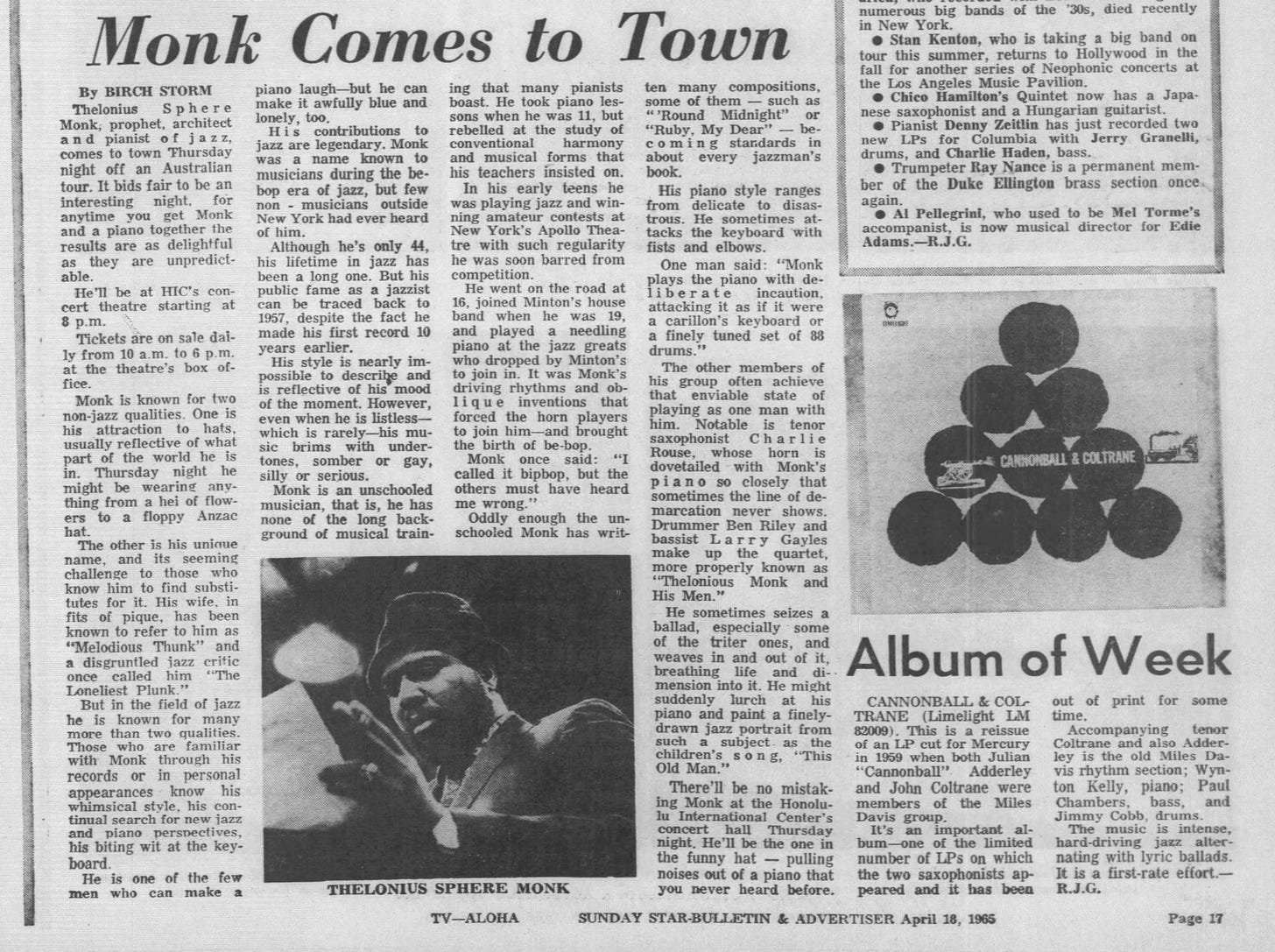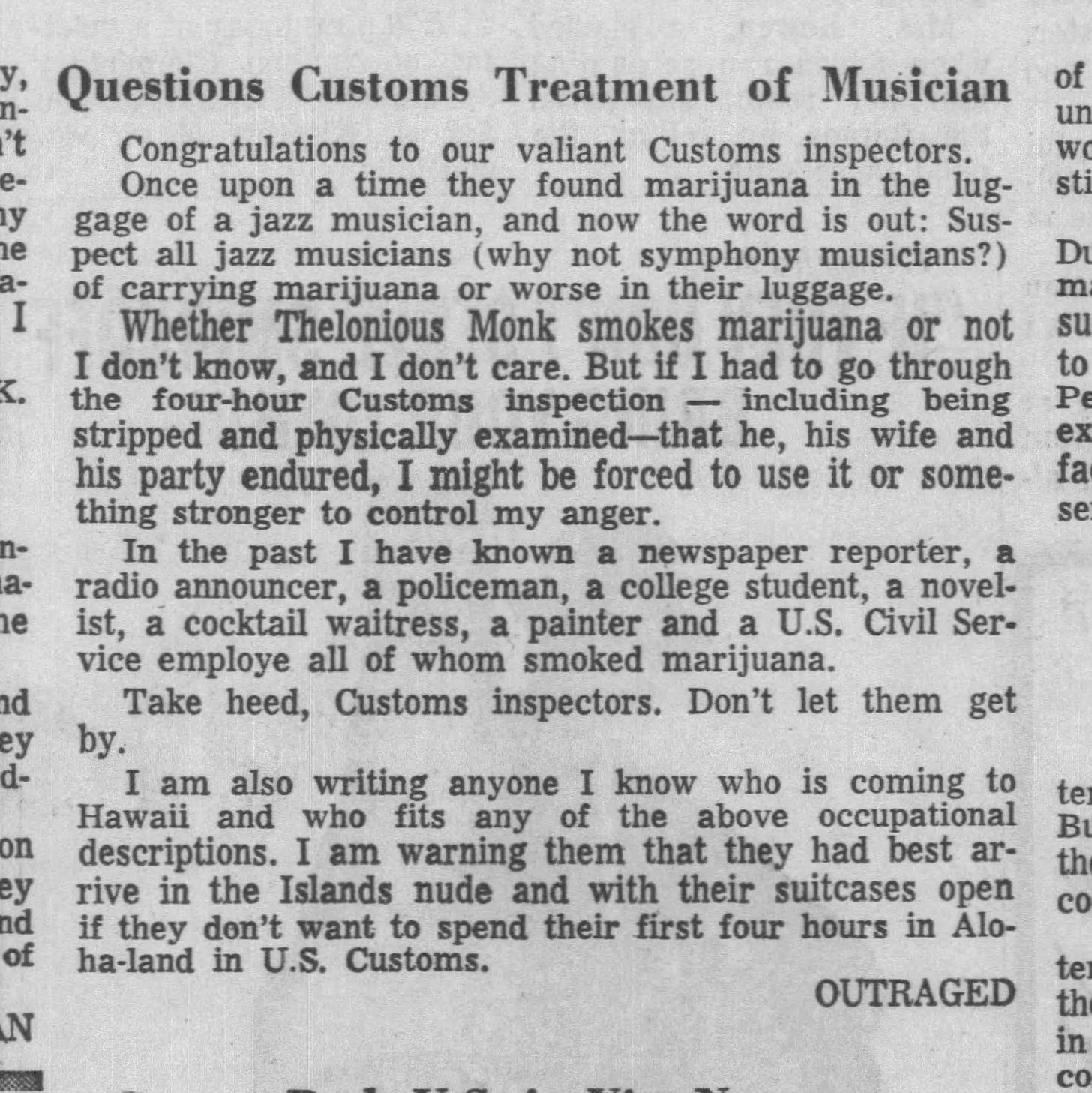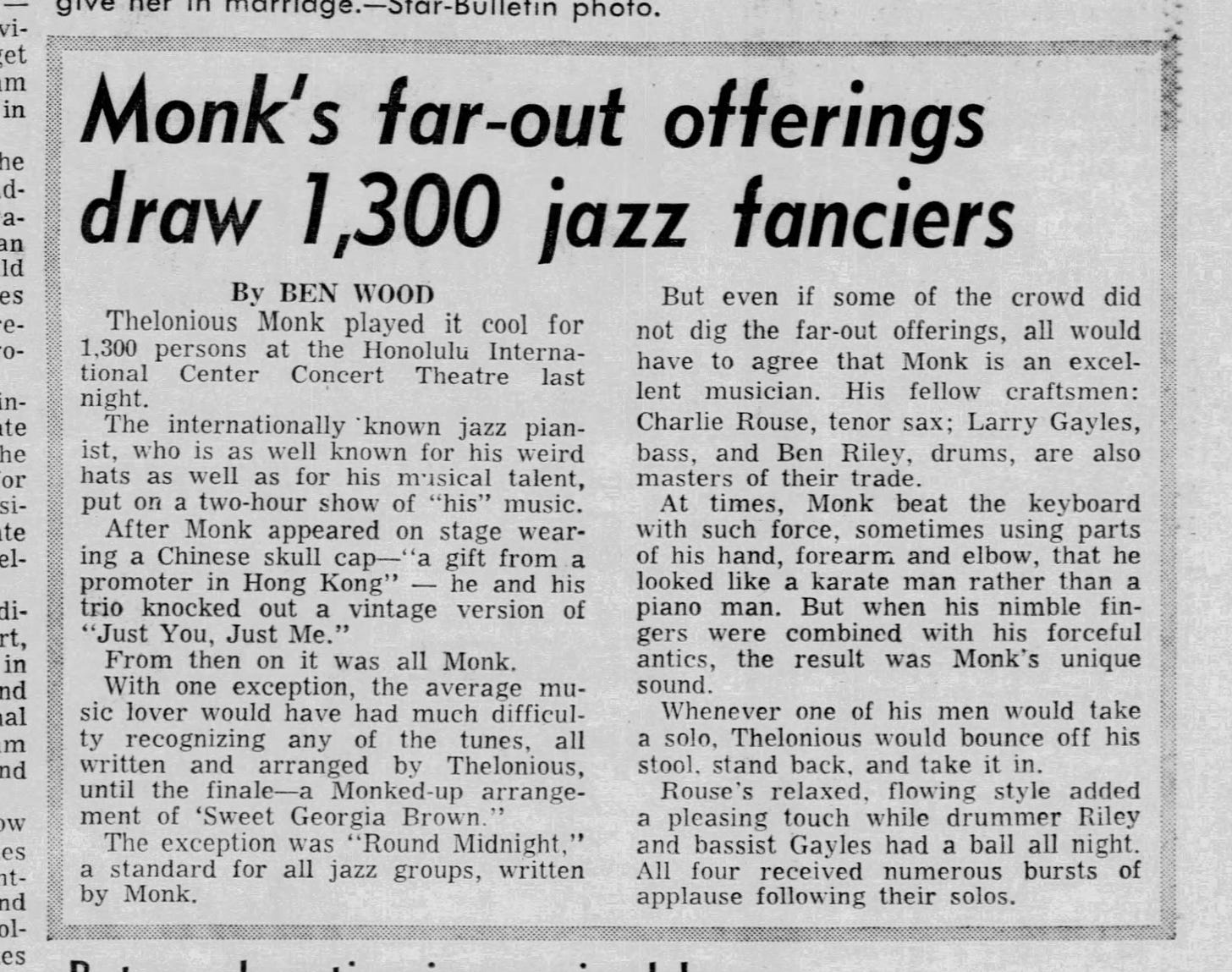Soon after my biography of John Coltrane was published early in 1998, I received emails from people who were inspired to conduct their own Coltrane research. Chris DeVito, a freelance editor in Urbana, Illinois, told me that he had access to newspaper archives, so I suggested that he might do more work on the chronology of Coltrane’s performances that took up the back of my book. Chris did such great work, and came up with so much information, that he became the primary researcher for the chronology section of the John Coltrane Reference, a big book that I initiated and edited, and for which I assembled the team of authors.
In the process of researching Coltrane’s gigs, Chris often came across details about other artists. One such paper trail documented a disturbing incident at the airport in Honolulu, Hawaii, when Monk, his wife Nellie, and their entire party were detained for hours at customs and subjected to a strip search. To my knowledge, this has never been reported since then, not even in Robin Kelley’s authoritative biography of Monk.
Thanks to Chris DeVito, I’m able to tell you this story through the newspaper coverage. First, let’s read an article about Monk’s forthcoming concert, to be held April 22, 1965 at 8pm. This was the first time he performed in Hawaii, and it came at the end of a long international tour produced by George Wein, known for the Newport Jazz Festival. Monk and his entourage had left N.Y.C. on March 4, and the first concerts were in Paris. The Hawaiian newspapers reported that they would arrive there the morning of April 21st on British Overseas Airways Corporation (now British Airways). You’ll see that two of the reporters state that they were coming from Australia, but Kelley’s book notes that after Australia there had been concerts in New Zealand. (In the comments below you’ll find memories from Tom King, George Neidorf, and other subscribers who actually attended the concerts in Australia and New Zealand.) Next was Hong Kong, but they arrived to learn that that concert had been canceled, so from there they flew to Hawaii. Here’s the preview of the concert—it’s a kind of summary of Monk’s career, fairly typical for that time, complete with comments about his hats and his name:
Next, another reporter conducted an interview with Monk that has never been reprinted. It took place in his hotel room the day before the concert. There’s a funny mistake near the end of the article. The author lists Wein’s right-hand person, Charles Bourgeois, as one of the musicians. Probably Bourgeois was standing with Rouse and Gales, and the author simply asked their names, assuming they were all band members. Bourgeois was Wein’s long-time publicist, and sometimes—as evidently happened in this case—he traveled with bands on tour, serving as road manager to make sure that everything went smoothly.
In the interview, Monk talks about various topics, from his hats, to pills and drugs, to race. He calls people from the American South “cannibals,” meaning, I believe, “savages”—one of his few public statements about racism:
Another reporter, Leanne Marks, visited Monk the day before the concert and conducted another interview. The article begins on a humorous note as Monk lies in bed in a darkened room and grunts his answers. But soon Marks gets him talking, and she offers details about the horrifying treatment that Monk endured from airport customs officials, along with his wife Nellie, Bourgeois, Rouse, Gales, and drummer Ben Riley. The author states that they were all subjected to “complete physical examinations”:
The day after the concert, a columnist, Eddie Sherman, clarified that they were actually held up at customs longer than was reported—it was four-and-a-half hours. But Sherman adds that that is “a common procedure.” In fact, I did a little googling and it appears that even today, the Honolulu airport has a reputation for being tough on travelers arriving from outside the U.S.A. Subscriber Chris Strawn notes that Louis Armstrong’s wife Lucille was arrested at their Honolulu hotel in January 1953 for marijuana possession, as detailed in Ricky Riccardi’s three-volume biography. (If you have had some experience with this, please share it in the comments.)
A few days later, one newspaper printed a letter from an anonymous reader who protested the way that Monk and his party had been treated, and signed with “Outraged.” This person speculates that jazz musicians were being singled out due to marijuana use, and notes that plenty of other people smoke marijuana, sarcastically urging the customs inspectors, “Don’t let them get by.”
To add to the negative experiences, Monk’s performance got a rather lukewarm reception in Hawaii, according to this review, which describes his music as too “difficult” for the “average music lover,” and says that “some of the crowd did not dig the far-out offerings”:
You might wonder what Monk and Nellie had bought that led to the assessment of "more than $700 in duty" taxes, mentioned in the “Sour Note” article above. Well, Kelley’s book does not mention the Hawaii airport incident, but it does report (p.375) that Monk bought three kangaroo-skin coats in Australia, and a black opal ring in Hong Kong, and, one would assume, they probably bought other luxuries as well.
To my knowledge Monk never again appeared in Hawaii, and if that’s the case, one can certainly understand why. Thank you, Chris DeVito, for sharing with us this unknown episode of Monk’s career.
All the best,
Lewis









Thanks for this, Lewis. As Tom King's comment above shows, Monk's 1965 visit to New Zealand is legendary and still talked about. It was the subject of an illustrated column on a New Zealand music history website, about unusual encounters. https://www.audioculture.co.nz/articles/rock-roll-rendezvous-mike-walker
Fascinating, thanks Lewis. A late friend was Frank Collins, a high school teacher and jazz enthusiast who was on the board of the Chamber Music Federation of New Zealand and persuaded them to arrange the tour in 1965. I was in the audience in Christchurch, and I recently met someone who was one of 11 in the audience in Hamilton, somewhat of a country and western hick town. The Federation hasn’t brought a jazz group here since. The visit changed my appreciation, earlier descended from the swing my mother brought with her from Kansas, and the great artist Ralph Hotere was a Monk devotee, while the poet Alex Wedde met Monk walking through Auckland in dead of night, conversation including real estate.